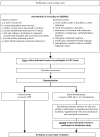Cocaine Addiction Treatments to improve Control and reduce Harm (CATCH): new pharmacological treatment options for crack-cocaine dependence in the Netherlands
- PMID: 21854580
- PMCID: PMC3175153
- DOI: 10.1186/1471-244X-11-135
Cocaine Addiction Treatments to improve Control and reduce Harm (CATCH): new pharmacological treatment options for crack-cocaine dependence in the Netherlands
Abstract
Background: Cocaine, particularly in its base form ('crack'), has become one of the drugs of most concern in the Netherlands, being associated with a wide range of medical, psychiatric and social problems for the individual, and with significant public order consequences for society. Available treatment options for cocaine dependent users are limited, and a substantial part of the cocaine dependent population is not reached by the addiction treatment system. Psychosocial interventions for cocaine dependence generally show modest results, and there are no registered pharmacological treatments to date, despite the wide range of medications tested for this type of dependence. The present study (Cocaine Addiction Treatments to improve Control and reduce Harm; CATCH) investigates the possibilities and problems associated with new pharmacological treatments for crack dependent patients.
Methods/design: The CATCH-study consists of three separate randomised controlled, open-label, parallel-group feasibility trials, conducted at three separate addiction treatment institutes in the Netherlands. Patients are either new referrals or patients already in treatment. A total of 216 eligible outpatients are randomised using pre-randomisation double-consent design and receive either 12 weeks treatment with oral topiramate (n = 36; Brijder Addiction Treatment, The Hague), oral modafinil (n = 36; Arkin, Amsterdam), or oral dexamphetamine sustained-release (n = 36; Bouman GGZ, Rotterdam) as an add-on to cognitive behavioural therapy (CBT), or receive a 12-week CBT only (controls: n = 3 × 36). Primary outcome in these feasibility trials is retention in the underlying psychosocial treatment (CBT). Secondary outcomes are acceptance and compliance with the study medication, safety, changes in cocaine (and other drug) use, physical and mental health, social functioning, and patient satisfaction.
Discussion: To date, the CATCH-study is the first study in the Netherlands that explores new treatment options for crack-cocaine dependence focusing on both abstinence and harm minimisation. It is expected that the study will contribute to the development of new treatments for one of the most problematic substance use disorders.
Trial registration: The Netherlands National Trial Register NTR2576The European Union Drug Regulating Authorities Clinical Trials EudraCT2009-010584-16.
Figures

References
-
- Miller NS, Gold MS, Mahler JC. Violent behaviors associated with cocaine use: possible pharmacological mechanisms. Int J Addict. 1991;26(10):1077–1088. - PubMed
-
- Trimbos-instituut. Nationale drugmonitor - Jaarbericht 2009. Utrecht: Trimbos-instituut; 2010.
-
- IVZ. Kerncijfers verslavingszorg 2009. Houten: Stichting Informatie Voorziening Zorg; 2010.
Publication types
MeSH terms
Substances
LinkOut - more resources
Full Text Sources
Medical

